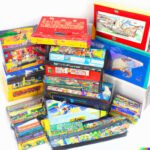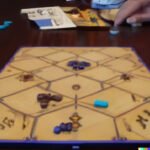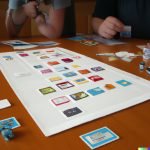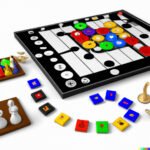The classic Candyland game board has been a beloved staple of childhood for generations, captivating players with its colorful and whimsical design. From its origins to its enduring legacy, the history of the Candyland game board is a fascinating journey through the world of children’s entertainment.
The creation and development of the classic Candyland game board will be explored in depth, shedding light on how this iconic game came to be and how it has evolved over the years. The intricate details of its design and artwork are not only visually stunning but also play a crucial role in immersing players in the delightful world of Candyland.
The vibrant illustrations have left an indelible mark on the hearts and imaginations of those who have played the game.
Moreover, this article will provide a comprehensive overview of the gameplay and rules of the classic Candyland game board, offering valuable insights into how to play, win, and any special features that make the game unique. Additionally, it will delve into the nostalgia associated with this timeless game, exploring the memories and emotions it evokes for those who have experienced its magic during their childhood.
Design and Artwork
The design and artwork of the classic Candyland game board have become iconic in the world of board games. From its inception, the game has featured colorful and whimsical illustrations that have captured the imagination of players for generations. The Candyland game board is a visual feast, featuring vibrant colors, fantastical settings, and adorable characters that bring the magical world of Candy Land to life.
One of the most recognizable elements of the classic Candyland game board is its path of colored squares, each adorned with different sweet treats and landscapes. These visually appealing squares guide players through the enchanting realm of Candy Land, where lollipop woods, gingerbread plum trees, and peppermint stick forests await. The charming illustrations on each square not only enhance the game’s aesthetics but also immerse players in a delightful fantasy world that adds to the overall enjoyment of playing.
In addition to its enchanting pathway, the classic Candyland game board also features captivating character illustrations that populate its sugary landscapes. Characters such as King Kandy, Princess Lolly, Mr. Mint, Queen Frostine, and Gramma Nutt are beloved figures that lend personality and charm to the game. Their endearing designs have resonated with players young and old, adding to the timeless appeal of the classic Candyland game board.
Gameplay and Rules
The classic Candyland game board is a beloved and timeless board game that has been enjoyed by countless children and families since its creation. The gameplay of Candyland is simple, making it accessible to young children and a great introduction to the world of board games. Here is a detailed overview of the gameplay and rules of the classic Candyland game board:
How to Play
- The game begins with each player selecting a gingerbread character as their game piece.
- Players take turns drawing colored cards from the deck and moving their piece to the nearest space on the board that matches the color on their card.
- The goal is to make it to the end of the winding path on the Candyland game board, known as King Kandy’s Castle.
Special Features
One of the unique features of Candyland is the presence of special spaces on the board that can either help or hinder a player’s progress. For example, there are spaces such as “Lollipop Woods” and “Peppermint Forest” where players can advance ahead, while others like “Sticky Spot” or “Molasses Swamp” may cause a player to lose a turn.
How to Win
The first player to reach King Kandy’s Castle at the end of the Candyland game board is declared the winner. There are no complex strategies involved, making it a purely luck-based game that relies on drawing colored cards and navigating through the whimsical world of Candyland.
Candyland’s straightforward gameplay, colorful artwork, and charming design have secured its place as a classic among children’s board games. It continues to be a cherished favorite for both new generations and those who fondly remember playing this delightful game in their own childhoods.
Nostalgia Factor
The classic Candyland game board holds a special place in the hearts of many, evoking fond memories and emotions for those who played it in their childhood. Created in 1949 by Eleanor Abbott during her recovery from polio, Candyland was designed to bring joy and entertainment to children. The simple yet colorful game board featured a winding path through the magical realm of Candyland, complete with vibrant illustrations of candy-themed characters and locations.
For many adults, revisiting the classic Candyland game board brings back cherished memories of carefree days spent playing with family and friends. The game’s whimsical design and easy gameplay made it a beloved pastime for generations, fostering a sense of nostalgia that continues to endure today. Many players vividly recall the excitement of drawing colored cards to advance their gingerbread playing pieces along the path, eagerly anticipating each turn as they ventured toward the fabled King Kandy’s Castle.
In addition to the joy and laughter shared while playing, the classic Candyland game board also holds sentimental value for adults as a reminder of their own childhood innocence and wonder. In today’s fast-paced world, reconnecting with the simple pleasures of childhood through games like Candyland offers a welcome escape from daily stresses and responsibilities.
| Classic Candyland Game Board Memories | Nostalgic Emotions |
|---|---|
| Fond memories of playing with family and friends | Excitement and joy experienced during gameplay |
| Remembrance of childhood innocence | Sentimental value as a reminder of carefree days |
| Reconnecting with simple pleasures of childhood | Escape from daily stresses and responsibilities |
Educational Value
The classic Candyland game board has long been recognized for its educational value, providing children with a fun and engaging way to learn important skills such as colors, counting, and turn-taking. This beloved board game has become a staple in many households and educational settings, thanks to its ability to combine learning with entertainment.
Some of the key educational benefits of the classic Candyland game board include:
- Color Recognition: One of the primary objectives of the game is for players to move their pieces along the colorful path on the board, which helps young children develop their color recognition skills.
- Counting Practice: As players draw cards and move their pieces forward, they must count the number of spaces to advance, providing valuable practice in basic counting skills.
- Turn-Taking Skills: Playing Candyland also teaches children important social skills, such as taking turns and following rules, fostering good sportsmanship and cooperative play.
The classic Candyland game board has been praised by parents and educators alike for its ability to make learning enjoyable for young children. Its simple yet effective approach to teaching colors, counting, and turn-taking has cemented its status as a valuable educational tool.
Additionally, many teachers have incorporated the classic Candyland game board into their classroom activities as a way to reinforce early learning concepts in a playful manner. Its widespread use in educational settings underscores its enduring appeal as an educational tool that continues to benefit young learners.
Variations and Editions
The Classic Candyland game board has been a beloved family favorite for decades, and over the years, there have been various editions and variations of the game that have added new twists and themes to the original concept. These adaptations have kept the game fresh and exciting for new generations of players, while also tapping into popular trends and interests.
From themed versions based on popular movies or TV shows to special editions with unique gameplay elements, the Classic Candyland game board has seen a diverse range of variations that continue to engage both children and adults.
Themed Versions
One of the most prominent trends in the world of board games is creating themed versions based on popular media franchises, and the Classic Candyland game board is no exception. Over the years, there have been themed editions featuring characters from beloved movies, television shows, and even other popular board games.
These themed versions often include special gameplay elements or unique twists that tie into the theme, creating a new experience for fans of both the original property and the Classic Candyland game.
Special Editions
In addition to themed versions, special editions of the Classic Candyland game board have also been released, offering unique gameplay elements or collector’s items. These special editions may feature deluxe components, exclusive packaging, or limited-run releases that appeal to collectors and enthusiasts. Some special editions also incorporate new rules or mechanics that add complexity or variation to the classic gameplay experience.
Educational Variations
Another interesting aspect of variations on the Classic Candyland game board is their educational focus. Some editions of the game have been designed specifically to reinforce learning concepts such as math, literacy, or geography. These educational variations often incorporate quizzes, puzzles, or other cognitive challenges that blend seamlessly with the familiar Candyland gameplay format. Such educational variations offer parents and educators an engaging way to help children reinforce important skills while having fun with this timeless classic game.
Overall, these various editions and adaptations serve to keep the Classic Candyland game board relevant in today’s gaming landscape while also adding diversity and excitement to its enduring appeal.
Collectibility and Memorabilia
When it comes to classic board games, few hold the same level of collectible appeal as the iconic Candyland game board. Over the years, this beloved game has gone through numerous editions and variations, each with its own unique design and artwork, making certain versions highly sought after by enthusiasts and collectors.
Rare and Vintage Editions
One of the main reasons for the collectibility of the classic Candyland game board is the existence of rare and vintage editions that are no longer in production. These early versions often featured different illustrations, color schemes, or even gameplay elements that have since been discontinued or updated in newer releases. As a result, collectors are willing to pay a premium for these hard-to-find editions, adding them to their treasured collections.
Special Themes and Limited Releases
In addition to vintage editions, special themed or limited release versions of the classic Candyland game board also contribute to its collectibility. From tie-ins with popular movies or television shows to holiday-themed editions, these unique variations offer a fresh take on the familiar gameplay experience. As a result, fans and collectors are eager to add these specialty editions to their shelves as part of their Candyland memorabilia collection.
High Demand in Collectors’ Market
The demand for rare or limited edition classic Candyland game boards has created a thriving collectors’ market where enthusiasts actively seek out specific versions to complete their sets. Online marketplaces often see listings for sought-after editions at competitive prices, reflecting the value that collectors place on acquiring these special pieces of gaming history. Whether for nostalgia or investment purposes, the appeal of owning rare or vintage Candyland game boards continues to attract dedicated collectors from around the world.
Legacy and Influence
The classic Candyland game board has undoubtedly left a lasting legacy in popular culture and has had a significant impact on the world of board games and children’s entertainment. Since its creation, Candyland has continued to be a beloved favorite among children and adults alike, standing the test of time as one of the most iconic and cherished board games in history.
Its enduring legacy is evidenced by the fact that it remains a staple in many households and continues to captivate new generations of players.
In popular culture, the classic Candyland game board has become synonymous with nostalgia, evoking fond memories of carefree childhoods and playful moments spent with family and friends. The game’s colorful and whimsical design, coupled with its simple yet engaging gameplay, has made it an enduring symbol of joy and innocence. Countless references to Candyland can be found in movies, television shows, literature, and even music, underscoring its pervasive influence in shaping our cultural landscape.
Moreover, the impact of the classic Candyland game board on the world of board games and children’s entertainment cannot be overstated. As one of the first board games designed specifically for young children, Candyland paved the way for countless other games aimed at early learners. Its educational value in teaching colors, counting, and turn-taking skills has set a standard for incorporating learning into play.
Additionally, the various editions and variations of Candyland have inspired innovation in game design and storytelling, leading to a rich tapestry of thematic board games that cater to diverse interests and preferences. Overall, the enduring legacy and influence of Candyland continue to shape how we perceive and interact with board games today.
Frequently Asked Questions
What Is the Original Candy Land Game?
The original Candy Land game was created in the 1940s by Eleanor Abbott. It was designed as a board game for young children, with a colorful and simple design to appeal to the imagination of kids.
How Do You Play Original Candy Land?
The original Candy Land game is played by each player drawing colored cards to move their token along the path on the game board. There are no decisions to make – it’s purely a game of chance. The first player to reach the end wins.
How Many Versions of Candy Land Are There?
There have been numerous versions and editions of Candy Land released over the years since its original creation. These versions include themed editions such as Disney’s Candy Land, Candy Land: Willy Wonka, and many more. Each version adds its own unique twist while keeping the core gameplay similar.

I love playing all kinds of games – from classics like Monopoly to modern favourites like Ticket to Ride.
I created this blog as a way to share my love of board games with others, and provide information on the latest releases and news in the industry.





